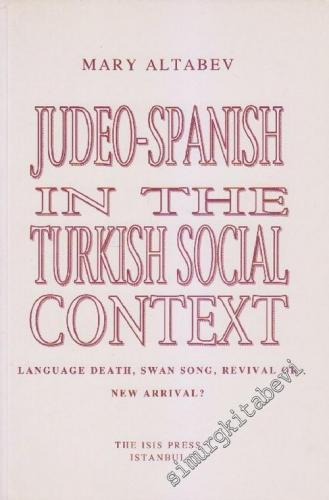#smrgKİTABEVİ Judeo - Spanish in the Turkish Social Context: Language Death, Swan Song, Revival or New Arrival? - 2003

This study could not have been accomplished without the help, advice and support of many. Amongst them, I would like to thank my supervisors, Prof. Brian Street and Dr. Max Wheeler for their meticulous assistance in every detail of the study. They complemented each other in their comments and criticisms and gave me the benefit of their separate experiences with great enthusiasm; the Linguistic Subject Group in the School of Cognitive and Computing Sciences at the University of Sussex for funding my fieldwork in Turkey; the Inter-library Loan Staff at the University of Sussex for their patience and perseverance in finding all the articles and books necessary for my work; the Turkish Jewish community in Istanbul for making me feel 'as if I had never left'. In particular, the participants who shared their views with me, and the community newspaper Şalom's staff who gave me invaluable support allowing me to use their facilities and letting me join their weekly editorial meetings.
In addition, I would like to name three special persons without whom my stay in Istanbul, and by implication my work, would have suffered. Men Faraci offered the courtesy of her home, Meri Asayas and Ferda Berker re-introduced me gently to the community, the life style and local values. All three of them became my invaluable 'safety valves' without which I could have not survived the fieldwork period unmarked.
I am also in debt to Moshe Shaul, editor of Aki Yerushalayim. He was the inspiration for the approach I took while constructing my methodology, working in the field, and also while analysing the data.
Last but not least, I am grateful to Nisim Altabev for encouraging me to continue with my studies, and helping me out to overcome difficulties such as taking the responsibility of our children during my fieldwork abroad. As for my children Karen and David Altabev, they have been extremely understanding and encouraging all along the way. I thank them all for their patience and emotional support. (From acknowledgements)
This study could not have been accomplished without the help, advice and support of many. Amongst them, I would like to thank my supervisors, Prof. Brian Street and Dr. Max Wheeler for their meticulous assistance in every detail of the study. They complemented each other in their comments and criticisms and gave me the benefit of their separate experiences with great enthusiasm; the Linguistic Subject Group in the School of Cognitive and Computing Sciences at the University of Sussex for funding my fieldwork in Turkey; the Inter-library Loan Staff at the University of Sussex for their patience and perseverance in finding all the articles and books necessary for my work; the Turkish Jewish community in Istanbul for making me feel 'as if I had never left'. In particular, the participants who shared their views with me, and the community newspaper Şalom's staff who gave me invaluable support allowing me to use their facilities and letting me join their weekly editorial meetings.
In addition, I would like to name three special persons without whom my stay in Istanbul, and by implication my work, would have suffered. Men Faraci offered the courtesy of her home, Meri Asayas and Ferda Berker re-introduced me gently to the community, the life style and local values. All three of them became my invaluable 'safety valves' without which I could have not survived the fieldwork period unmarked.
I am also in debt to Moshe Shaul, editor of Aki Yerushalayim. He was the inspiration for the approach I took while constructing my methodology, working in the field, and also while analysing the data.
Last but not least, I am grateful to Nisim Altabev for encouraging me to continue with my studies, and helping me out to overcome difficulties such as taking the responsibility of our children during my fieldwork abroad. As for my children Karen and David Altabev, they have been extremely understanding and encouraging all along the way. I thank them all for their patience and emotional support. (From acknowledgements)





















